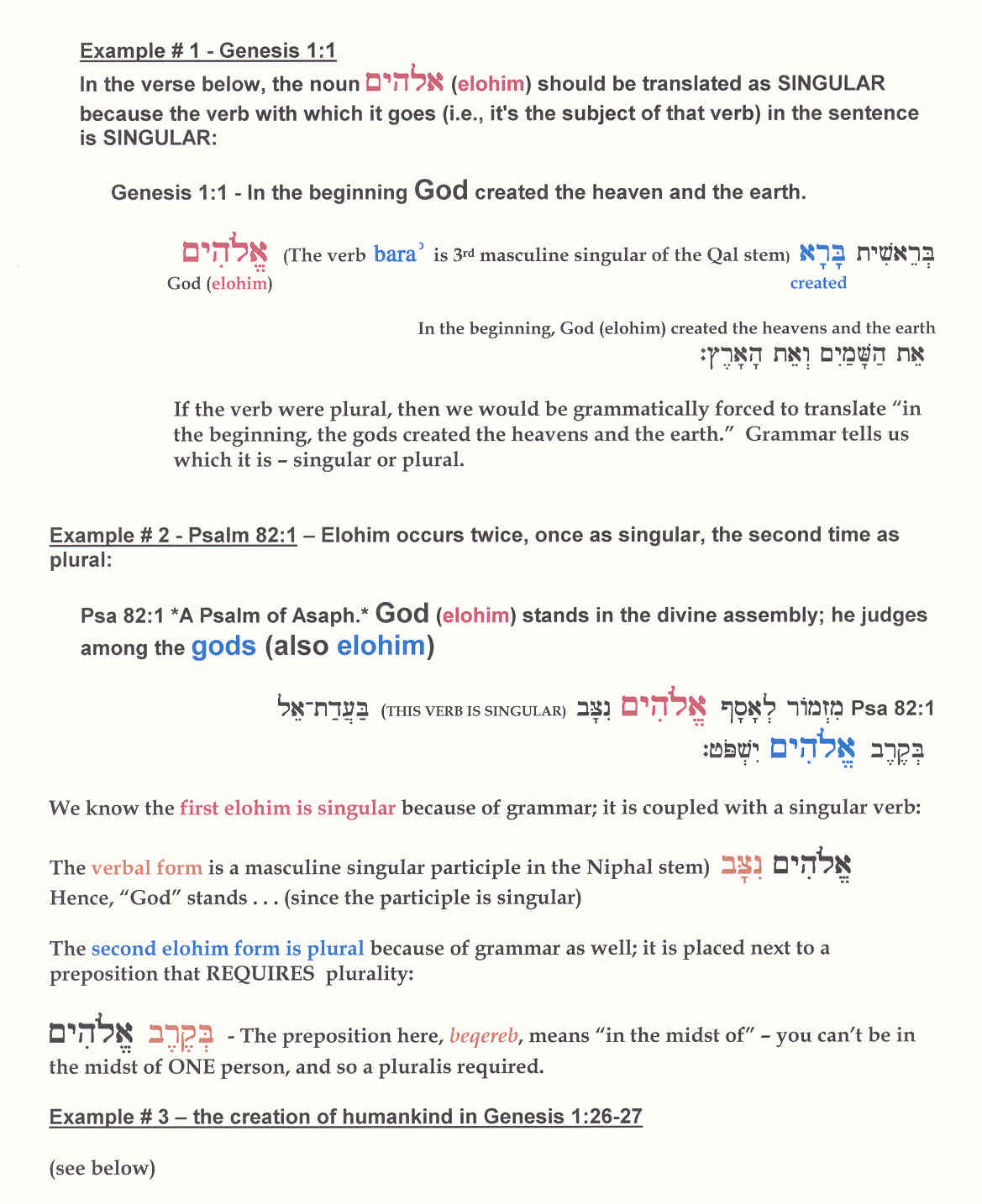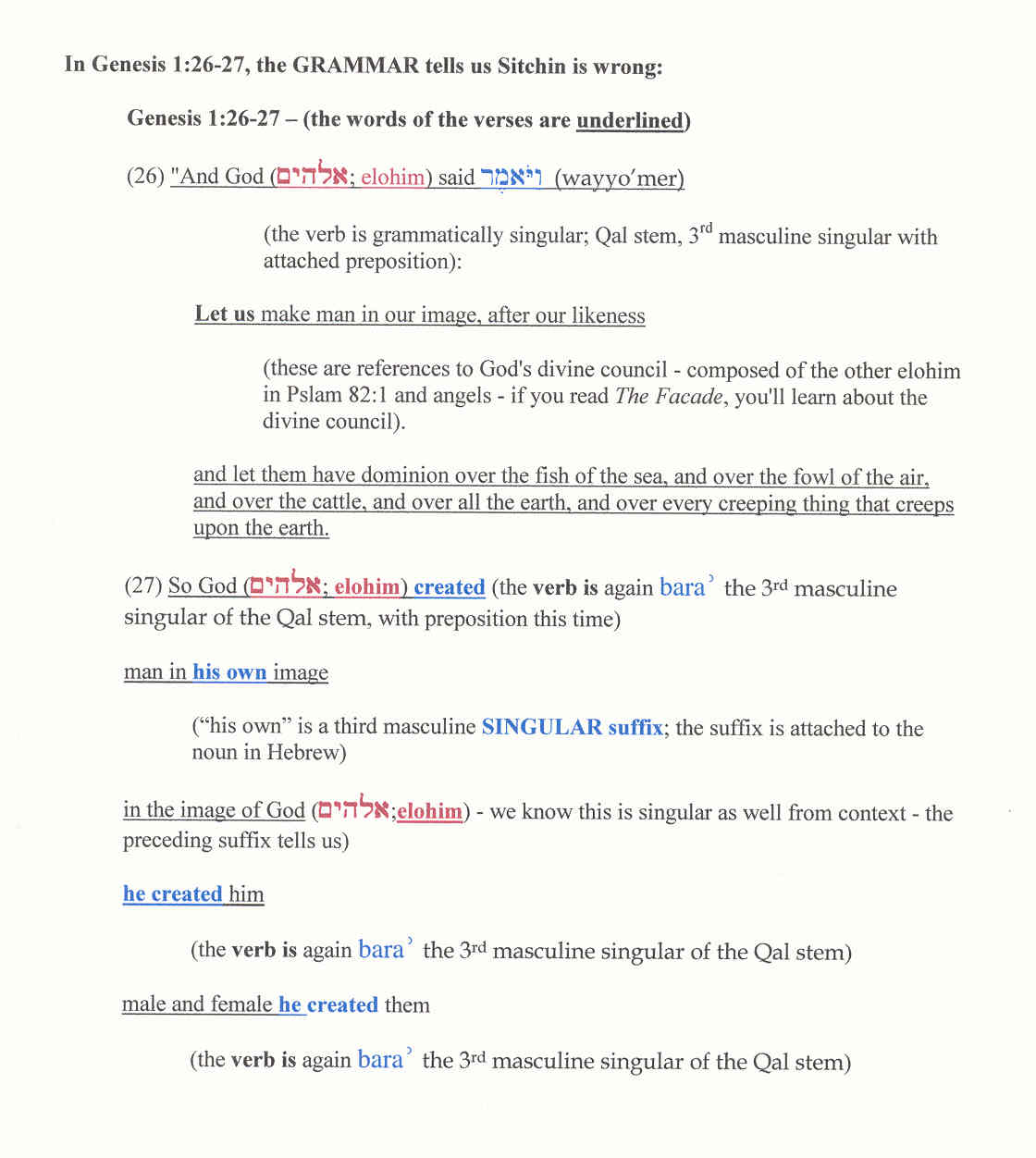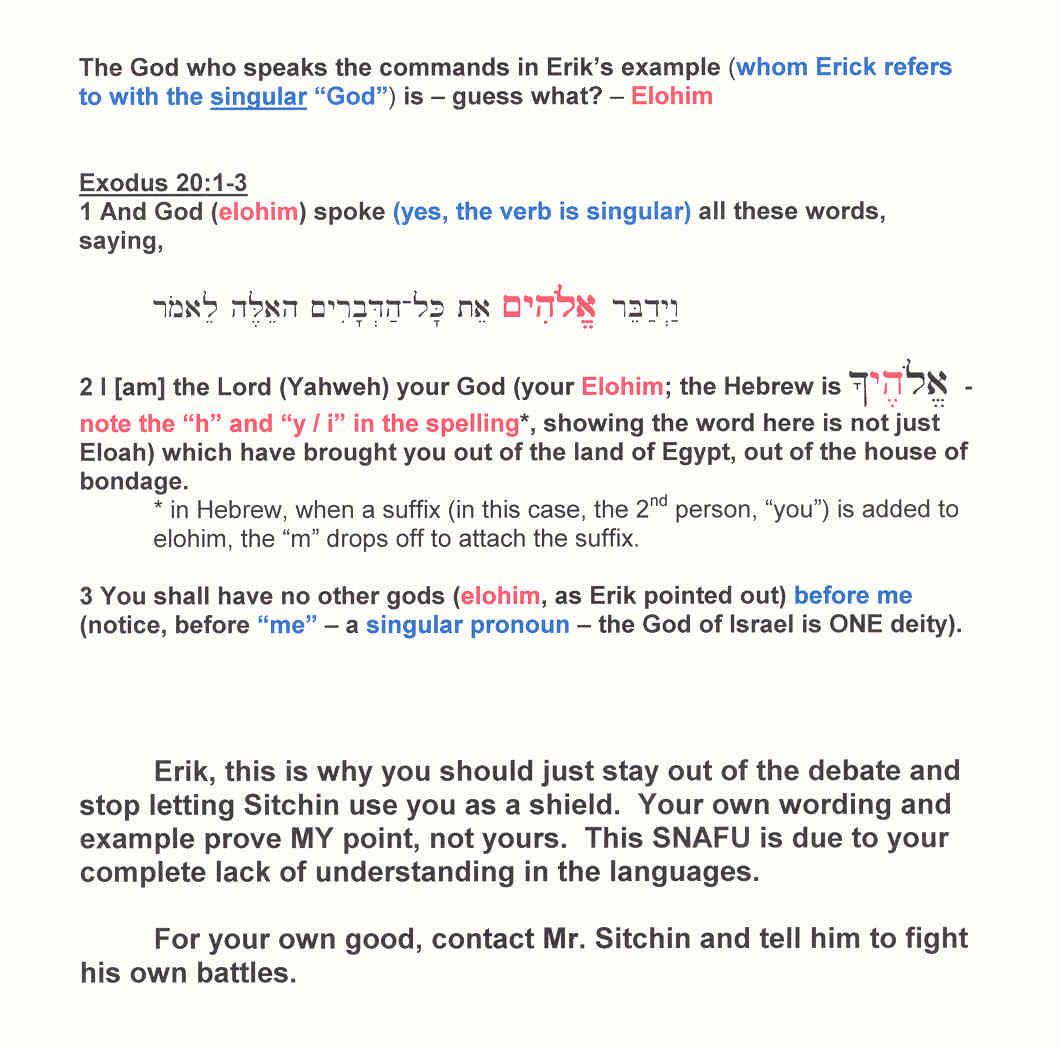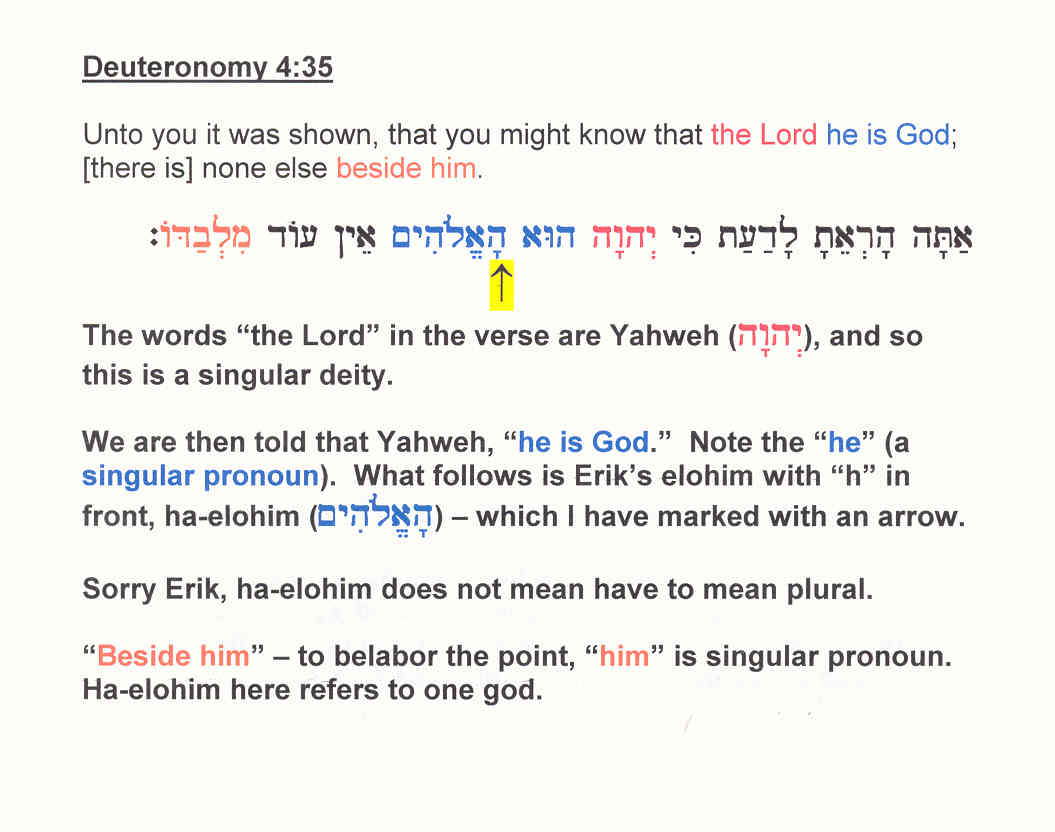
Sitchin's
Disciple: Clueless but Courageous
Erik Parker's Response
to My Posting Refuting
Zecharia Sitchin's Mesopotamian Rocket Theory,
and My Rejoinder
As many visitors to Rense.com know by now, I have an academic bone to pick with Zecharia Sitchin. In the wide field of research into the anomalous, I am something of an anomaly myself : a credentialed scholar of Ancient Hebrew and Semitic Languages (see my CV) who takes these issues seriously (as opposed to just laughing at them). I have publicly stated I think Sitchin's theories are hopelessly flawed, and have tried to put the evidence for this claim into the public forum of the internet, as well as through radio shows like Coast to Coast AM with Art Bell, and Jeff Rense's show. Disagreement with me on the part of Sitchin followers was inevitable, and so here we are.
In the past few days, Erik Parker, Zecharia Sitchin's webmaster, has tried to respond to my criticisms of Sitchin. Aside from finding it curious as to why Erik would do this, given that he has absolutely no knowledge of Hebrew or any other ancient language, I have to admire his pluck. He has more courage than his mentor for sure, since it has been 15 months since Art Bell asked if I would debate Sitchin on his show (I accepted the idea immediately). The call for a debate went out again this past weekend on Coast to Coast, but instead of a response from Mr. Sitchin himself, we get this, a clueless (but courageous) attempt by a devoted disciple to fight his master's battles. Oh well. In view of Mr. Parker's complete lack of understanding of the languages and issues, I don't want to criticize him harshly in my critique below. Like I said, he has guts. Nevertheless, a response is in order. Perhaps this has helped me explain my arguments more clearly for the lay audience. I have to admit, though, that trying to convince fawning Sitchin followers to look at actual data and scholarship is like trying to convince the Argentine authorities that a long-snouted mouse really hasn't mutilated over 100 cattle there; or like convincing Philip Klass that there really are UFOs; or like telling a Cubs fan that he'll never see a World Series home game at Wrigley Field; or like telling the Russian people that the Olympics really was rigged. In short, people want to believe things, facts be damned.
**Below is Mr. Parker's posting - in the color gray. My responses are in green.
Michael Heiser Is Incorrect With His Analysis Of Elohim & Nephilim:
Reply From Zechariah Sitchin's Webmaster
From Erik Parker - Los Angeles; Webmaster for Zecharia Sitchin
via Ted Susu-Mago; smago@ashlandhome.net; 8-19-2
Mr. Heiser claims that the word Elohim in Hebrew, meaning "gods" is not a plural
word.
Wrong already (we lasted one sentence). To quote form my own website, I ask this question: "Does Elohim, since it is morphologically plural in Hebrew, always (or even most of the time) MEAN "gods" (plural)?" Apparently Erick does not understand the question, and perhaps I assumed too much of a knowledge base. Elohim is certainly morphologically plural. Morphology refers to the "shape" or construction of a word - its form. As anyone can see, I say that very clearly above. My point in the question, though, is that while Elohim is plural in form, is it plural in meaning? By itself, Elohim can be either singular or plural in meaning. Again, quoting from my own website:
The word "elohim" CAN mean either plural "gods" or singular "god" (or "God" as a proper name). The meaning of any occurrence of Elohim must be discerned in three ways:
A. Grammatical indications elsewhere in the text that help to determine if a singular or plural meaning is meant.
B. Grammatical rules in Hebrew that are true in the language as a whole.
C. Historical / Logical context
Please witness: there is no denial that Elohim can mean "gods". Mr. Parker either did not read my material, or (more probable) is so deficient in his understanding of grammar (even English grammar terms) that he hasn't gotten the point. To continue - what I am saying is that, by itself, the word Elohim is ambiguous in meaning - as are all words, to some extent - it needs to be put into a sentence (I hope I don't have to define "sentence"). We have words like this in English, such as:
"deer", "sheep", "fish" - the point is you need other words to help you tell if one or more than one of these animals is meant. Sometimes these other words are verbs that help you tell. Compare the two examples::
1) "The sheep is lost" - the word "is" is a singular verb (It goes with a singular subject; one wouldn't say, for example, "I are lost" - you would use a verb that goes with the singular subject ("I am lost").
2) "The sheep are lost" - the word "are" is a plural verb (again, another word next to our noun "sheep" tells us in this case that plural sheep are meant.
All of this is just basic grammar - and every language has grammar. Biblical Hebrew has its own ways of telling us if Elohim means ONE person or many gods. It matches the noun Elohim to singular or plural verbs, or with singular or plural pronouns (to use "sheep" again as an example: "Those sheep are white"). The word "those" is what's called a demonstrative pronoun - it automatically tells us that sheep in this sentence is meant to be understood as a plural.
Mr. Parker should at least get the argument right if he is going to criticize it. On the other hand, Sitchin ignores grammar everywhere, so maybe "like master, like disciple".
Continuing . . .
His [Heiser's] main proof is that it says in Hebrew "The Elohim Said" in a singular form not a plural form. This would indicate that the word Elohim was a name and not meaning plural gods. Of course this also could mean that the scribes of the Bible kept it in a singular form to show the monotheistic viewpoint.
Wrong again. If you look at what I have posted on the website, I point out that the Hebrew Bible contains just such evidence of plural elohim - in places like Psalm 82, Deuteronomy 32:8-9, Psalm 89:1-10; Psalm 29:1, etc., etc. Maybe you don't get this point here, either, Erik. How can you claim the scribes edited the text to cover plural gods, when such passages are in the Bible? This makes little sense.
Statistically, Elohim occurs roughly 2,500 times in the Hebrew Bible with singular verbs or other singular grammatical indicators. Far more than the plurals, to be sure, but there are absolute affirmations of divine plurality in the Jewish Bible. If you want to argue censorship of this, it occurred in late antiquity in rabbinical writings after the rise of Christianity (which used such pluralities to argue for Trinitarianism). Professor Alan Segal's book, "Two Powers in Heaven" documents how divine plurality BECAME a heresy to the rabbis during this period. My own view is that monotheism should be defined in context of this plurality - that monotheism means Yahweh is incomparable; no other gods can compare to him (as opposed to saying, as most Christians and Jews do, that other gods don't exist - which is a denial of their own Bibles). Put another away, "Yahweh is an Elohim, but no other Elohim are Yahweh - he is NOT a "species equal". Israelites had 4-5 criteria for determining how Yahweh was the "true god," but I won't launch into that here.
Continuing . . .
There are many uses of the plural term of the word Elohim in the Bible.
Again, I haven't denied there are plural uses (see above, and the website). "Many" is an overstatement, though - and most of what are there refer to the surrounding gods of other nations, not the God of Israel.
I have listed several plural forms below and it is in fact very hard to find any singular uses of the word.
That's because you don't
read Hebrew and don't understand Hebrew grammar. You don't understand what
morphology is.
The word Elohim is definitely plural and does indeed mean "gods" and it actually
contains two forms of the singular word for God inside of itself.
This "inside
itself" is something of a linguistic mis-statement, but oh well.
1. The word EL means God and it is the first part of the word Elohim.
Correct - El does mean "god" as in a single deity.
2. The word Eloah, also means God and it is the first part of the word Elohim.
Eloah in Hebrew is a three letter root which most Hebrew words contain.
Correct again - you're on
a roll, Erik. Eloah is singular for "god" (used most often in
Job), and has three radicals (consonants). Eloah is considered the base
for the plural form "elohim" (because of the "h"), but El is
also pluralized as Elohim, which you don't seem to understand.
Here we already have two singular forms of the word God inside the plural word
Elohim. Yet, Mr. Heiser has never mentioned these singular forms inside the plural
word. He still insists Elohim is singular knowing well that is already contains two
singular words for God.
Here's where you are beginning to show how far out of your field you are, Erik. I'm not going to reproduce the dictionary or all the Hebrew words / references to "god". It's a matter of space. Buy a dictionary. Your wording implies that since El and Eloah exist in the language, then Elohim can't be singular. Again, you conclude this because you have no background in Hebrew. Elohim is singular over 2500 times (and no, I'm not going to post all of them). Here are a few easy ones from the website (keep in mind Hebrew is to be read right to left):


The Universal Creator God
(note Erik sees this God as singular - one god; see a bit below for why this is noteworthy)
of the Bible known as Yahweh speaks and is quoted within the Bible. When he spoke to the ancient Hebrews while giving them the 10 commandments, he indeed used the plural word of Elohim meaning gods.
Yes, the word is elohim -
and the verbs are SINGULAR (but again, Erik - and Mr. Sitchin - it's about the
grammar)
3. And God said "You shall not recognize the gods of others in my presence" also
translated as "You shall not have other gods in my presence," (Exodus 20:3). Here
Yahweh uses the term Elohim to refer to all other gods (plural) that Israel shall not
worship or acknowledge. This also means that there were other false gods and they were forbidden to be acknowledged in Yahweh's presence.
Right again - but guess what? You just said above that "Yahweh" spoke this sentence (correct), but in Exodus 20:1, when the list of commands begins to be uttered, the word for the God who is speaking is ELOHIM (i.e., the God who is speaking the commands is identified in Exodus 20:1, prior to 20:3 which Erik quotes). Since you don't know the languages, you have unwittingly given an example of Elohim used as a singular - and hence proven MY point. Here's the passage, with your verse cited as well as the preceding 20:1:

Mr. Heiser is also incorrect when he refers to the translation of the Nephilim. The Nephilim mentioned in Chapter 6 of Genesis is spoken about right before the destruction of the flood and is implied they are the reason for the flood. It says that "the Nephilim were on the Earth in those days and also afterwards when the Children of the Gods saw the daughters of the Adam (humans) and took them as wives which ever they pleased."
No kidding - they were (part) of the reason. Where's the rebuttal? I don't see one. The nephilim (giants) survive, though (Gen. 6:4 - there were giants in those days and afterward"). The nephilim, the offspring of the sons of God, were to be wiped out. The book of Enoch goes over this in great detail. Here's a passage.
1 Enoch 6:1-7a
1 And it came to pass when the children of men had multiplied that in those days were born unto 2 them beautiful and comely daughters. And the angels, the children of the heaven, saw and lusted after them, and said to one another: 'Come, let us choose us wives from among the children of men 3 and beget us children.' And Semjaza, who was their leader, said unto them: 'I fear ye will not 4 indeed agree to do this deed, and I alone shall have to pay the penalty of a great sin.' And they all answered him and said: 'Let us all swear an oath, and all bind ourselves by mutual imprecations 5 not to abandon this plan but to do this thing.' Then sware they all together and bound themselves 6 by mutual imprecations upon it. And they were in all two hundred; who descended in the days of Jared on the summit of Mount Hermon, and they called it Mount Hermon, because they had sworn 7 and bound themselves by mutual imprecations upon it . . .
Note that it is the angels who lust after the women, so as to have children (keep reading)
1 Enoch 7
1 And all the others together with them took unto themselves wives, and each chose for himself one, and they began to go in unto them and to defile themselves with them, and they taught them charms 2 and enchantments, and the cutting of roots, and made them acquainted with plants. And they 3 became pregnant, and they bare great giants, whose height was three thousand ells: Who consumed 4 all the acquisitions of men. And when men could no longer sustain them, the giants turned against 5 them and devoured mankind. And they began to sin against birds, and beasts, and reptiles, and 6 fish, and to devour one another's flesh, and drink the blood. Then the earth laid accusation against the lawless ones.
Note that it is the OFFSPRING of the sons of God, the ones from heaven, that are the giants - the Nephilim. Sitchin constantly confuses the two (as do others, like Andrew Collins and Laurence Gardner). Keep reading for the rest of the story - and how it relates to Erik's objection.
1 Enoch 9
Thou seest what Azazel hath done, who hath taught all unrighteousness on earth and revealed the eternal secrets which were (preserved) in heaven, which 7 men were striving to learn: And Semjaza, to whom Thou hast given authority to bear rule over his associates. And they have gone to the daughters of men upon the earth, and have slept with the 9 women, and have defiled themselves, and revealed to them all kinds of sins. And the women have 10 borne giants, and the whole earth has thereby been filled with blood and unrighteousness. And now, behold, the souls of those who have died are crying and making their suit to the gates of heaven, and their lamentations have ascended: and cannot cease because of the lawless deeds which are 11 wrought on the earth. And Thou knowest all things before they come to pass, and Thou seest these things and Thou dost suffer them, and Thou dost not say to us what we are to do to them in regard to these.'
1 Enoch 10:1-3
1 Then said the Most High, the Holy and Great One spake, and sent Uriel to the son of Lamech, 2 and said to him: 'Go to Noah and tell him in my name "Hide thyself!" and reveal to him the end that is approaching: that the whole earth will be destroyed, and a deluge is about to come 3 upon the whole earth, and will destroy all that is on it.
[Note that the birth and terror of the giants is one of the reasons for the Flood]
4. The word children is used as plural not singular child,
I have no idea what the point of this one is - I never said anything to the contrary.
and the Elohim are mentioned again in plural as "The Gods" In Hebrew the "hey" letter put in front of the word Elohim means "The",
Erik is talking about the form "ha-elohim" ("h" letter in front of elohim), and he is correct; that letter is the definite article in Hebrew (the word "the")
If the letter was left out it would mean "Children of Elohim" meaning Elohim as a name. But with the letter there in front it clearly means "Children of the Gods".
Once again, Erik, your ignorance of Hebrew grammar shows. You are assuming that the presence of the article ("h"; Hebrew letter "he[h]") denotes plurality. It can (grammar will tell us), but it also may not - try this one on for size:

Nephilim has the root from the Hebrew word for falling down or to fall, which yields the translations the "fallen ones" and in the context of the Bible they are mentioned as bad characters that have something to do with the Flood disaster.
As my work on the website
has shown, nephilim cannot mean "fallen ones" (as in humans fallen in
battle). If that were the
case, then according to Hebrew GRAMMAR, you'd
have to say nephilim was a masculine plural passive participle of the Qal stem.
If you consult any Hebrew grammar the masculine plural participle form would be
spelled "nephulim"
(try Seow, Kelley, Lambdin, Jouon-Muraoka, Weingreen, etc. - ANY biblical Hebrew
grammar). The form of the word (and hence the translation) for which you
are arguing is spelled all wrong. See the link to my PDF file on this for
more detail.
5. Nephilim used to be translated as Giants for many hundreds of years and it
comes from a 12th Century commentary known as Rashi
No, Erik; it comes from the morphology (the shape) of the word - the grammar. Besides, it's Aramaic anyway. Incidentally, the Aramaic root of nephilim (which is nephila') shows up in an Aramaic translation of the book of Job discovered at Qumran. The word is used to translate "Orion" (the giant - what else?). Check your chronology (among other things); the Dead Sea Scrolls are a lot older than Rashi.
that said the Nephilim were giants. But what nobody realized until Sitchin was that the word in Hebrew meaning giants is Anak, or Anakim for plural which is the same root and sounding as Anunnaki in Sumerian.
Anakim is a people name; its etymology doesn't "mean" giants, but it is no doubt associated with giantism. Sitchin shows ignorance of Sumerian here again. Sumerian is not related to Hebrew (in fact - mysteriously - it isn't related to any other ancient language).
So the Hebrew word for Giant was picked up from a memory of the word used thousands of years before, by the lineage of Abraham to describe their gods which are usually depicted as larger humanoids than humans. And the translation of the word Annunaki means "those who from Heaven to Earth came," and Sitchin's use of the word Nephilim means "Those that have fallen down from above."
This is linguistic poppycock. Readers should at this point go to the link above for a complete refutation of all this. I'm not going to type it again. You know, Erik, readers will no doubt notice that you haven't interacted with any of the verses or arguments I present in my PDF file at the above link. Didn't you think I'd direct them there?
So Anunnaki has the same sound as the word for Giant in Hebrew and the meaning is the same as the word Nephilim in Hebrew.
Doesn't work again - look up Numbers 13:33. The text point-blank says that the Anakim came from the nephilim. Your argument just went down the tubes. Have a look:

6. Before the burning bush Moses came to the mountain of the Gods. It says in
Hebrew once again "He arrived at the Mountain of the Gods." The Hebrew letter
"hey" in front of the word Elohim means "The" as opposed to saying "Elohim mountain" meaning the name of the mountain, it says "the Mountain of the Gods."
(Exodus 3:1)
Wrong again - see the discussion above about ha-elohim, and the example for refutation.
Not a single one of Erik's points are academically correct; not even close. But hey, he doesn't know Hebrew. Now for a personal note.
A Plea and A Challenge
Erik, I offer a plea to you at this point. You are no doubt a very competent webmaster, and, in view of how much time you've put into reading Sitchin, a zealous and inquisitive student. My plea is simple: Don't let Zecharia Sitchin use you to take the brunt of his flawed scholarship. You are way out of your field, and have no idea what what you're talking about. Save yourself the trouble, and invite - indeed, demand - that your hero stand on his own.
Addendum 4/14/03: Since my original response to Erik, he has posted a rejoinder on his website. As expected, he does not address any of the actual textual data in this presentation or the others on my website. He focuses instead on how I am trying to leech off Sitchin's greatness. I'll get around to responding eventually. I'd just like to see even one of my points in my open letter to Sitchin addressed coherently - with data from ancient texts (that's where all this knowledge is supposed to be coming from, isn't it?). For a running list of what Sitchin and Erik are avoiding, click here and go down to the open letter.
That ought to cover it.
Michael S. Heiser
PhD candidate, Department of Hebrew and Semitic studies,
University of Wisconsin-Madison